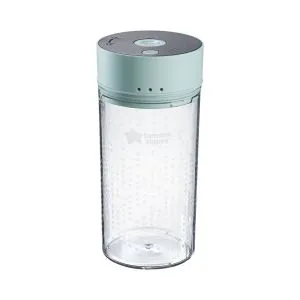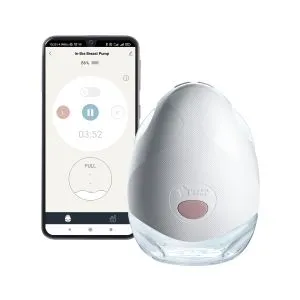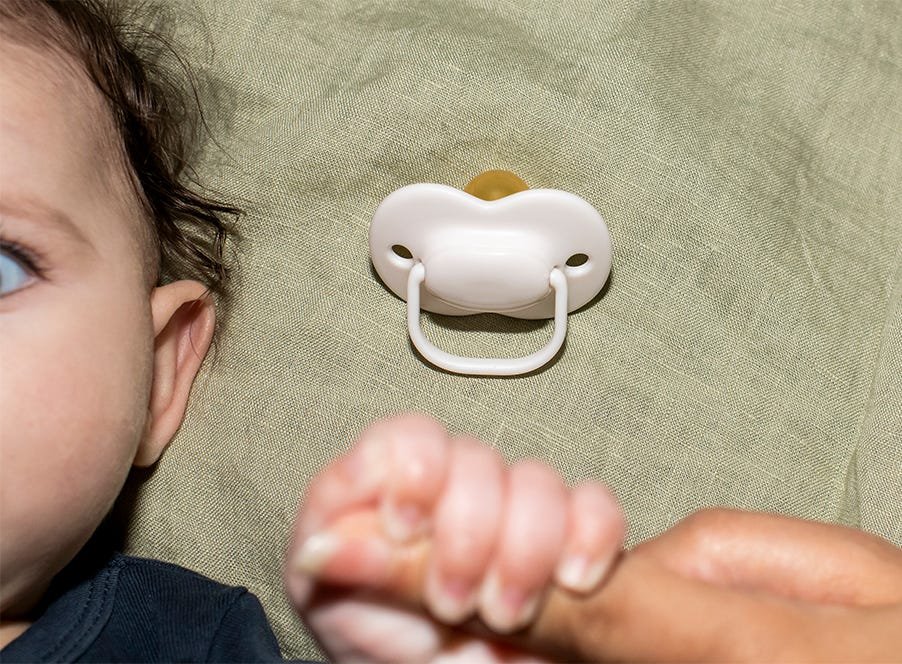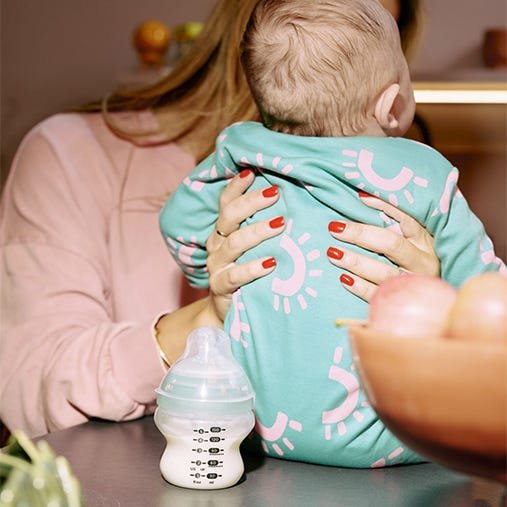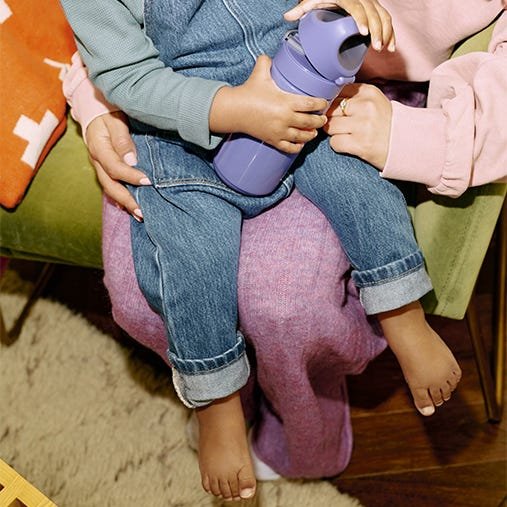If you're a first-time parent, it's likely that you were already thinking about when your little one would start to smile, giggle, walk, and talk long before they were born!
Sam Saunders from The Baby Guru says that "as parents and caregivers we have a significant impact on a child's development. It can be challenging, but also so rewarding watching them grow, explore and discover all the opportunities that're offered to them".
Every month with a new baby brings with it exciting developments. So, to help you know what to expect - and when to expect it - we've pulled together this guide to the key stages during the first 24 months of your baby's life.
Let's get started!
0-3 month baby development
During these early months, it may feel like your tiny new arrival is settling into in a non-stop cycle of eating, sleeping, crying, and pooping. Outside of that repetitive routine, there's actually tons of other amazing stuff going on with their little body, and they'll develop loads in the first three months!
At about one month old, your little one may be able to briefly hold your gaze. It's proven that newborn babies can see large shapes and faces when they're near them, so even in the early days, time spent interacting is super important for their development.
They'll hold and examine their own hands, be able to follow a toy held in front of them in a semi-circle, and can grasp and hold your finger, uttering little noises when content. You can also look forward to your baby lifting their head on their own and learning how to smile!
You can begin to introduce tummy time to your baby from birth by lying them on your chest when you're wide awake. Then, when your baby is ready, try doing tummy time on the floor. It helps to develop the muscles in their back, neck, and shoulders that they'll need for sitting and crawling later on.
It can take some babies a bit of time to get used to lying on their tummy, so try putting some toys out within easy reach and propping your baby up a bit by putting a small, rolled-up towel under their arms. If they still seem unsure, that's okay, some babies just don't like being put on their tummies and that'll change as they continue to develop week by week.
By three months of age, your little one will show some real developments in their speech, language, and communication skills, showing excitement at the sound of voices, the bath water running or even footsteps approaching.
4-6 month baby development
Between four and six months, babies start seeing in 3D and can focus on things a little further away. Your little one will now begin to recognise their own name, show emotions like excitement, likes and dislikes, and they'll start babbling to communicate with you.
They'll copy the movements, facial expressions and sounds of others and start blowing raspberries, so get your tissues ready!
Most babies begin teething by the six-month mark, and they'll start sucking and chewing on anything and everything. At the same time, you'll be ready to begin weaning. Bring on the soft finger foods and mush - it's messy, but also lots of fun!
7-9 month baby development
Get ready to be kept on your toes because your baby will probably start crawling or shuffling around the house on their bottom during these months. Make sure that your home is baby-proofed and that they have a safe space to explore.
Over the course of these months, they'll learn how to sit for a long time without support, reach out for objects, and use gestures like pointing to show you things. Their fine motor skills will kick into gear, and they'll be able to poke at small objects, grasp string between their finger and thumb using a pincer grip and start to enjoy letting go of objects over the side of the highchair or cot - uh oh!
They might begin responding when people chat to them by making repetitive babbling sounds. You may hear their first few simple words, and they'll understand a small number of words like "no" and "bye-bye". They'll also start to react to questions like "where's mummy/daddy?" by looking around the room.
10-12 month baby development
By the time they've reached the 10-month mark, your little one will begin to wave their hands to greet others and shake or nod their head when you ask them a question.
During these months they'll also start to find their feet and begin exploring the world around them by holding onto furniture and cruising around the house. It's important to remember that some slips and falls are all part of learning!
They'll probably have chosen a favourite toy by now, and they'll enjoy playing hide and seek games. Get ready to meet their cheeky side as they learn how to drop and throw things deliberately to test your boundaries.
Sam from The Baby Guru says that "between 10-12 months old, little ones often become clingy and start to show signs of separation anxiety or object permanence, an understanding that objects continue to exist even when they cannot be seen. They can clearly distinguish between strangers and familiar others, requiring reassurance before accepting their smiles and cuddles".
By the time they reach month 12 (one whole year!) they'll learn to copy you and begin to understand how to use everyday objects like hairbrushes, keys, and telephones.
13-18 month baby development
Get ready to step into toddlerhood and put on your dancing shoes, because your little one can now recognise songs and will start to bop along from the age of 13 months. They'll stand and cling onto your legs and hands for support as they walk, and even give kisses - aww!
During these months, they're becoming increasingly independent at mealtime, and can hold and drink from a cup and feed themselves without any assistance.
By 15/16 months, they might be able to build a tower of two or more bricks and hold crayons to draw you some lovely colourful creations, your fridge will soon be covered in one-off works by your mini-Picasso!
At 18 months of age, they'll start to recognise themselves in a mirror, and show a preference for being left-handed or right-handed. They'll also really start to find their feet and might be able to run in short spurts. If your baby is not walking independently by 18 months, then you should speak to your Health Visitor or Family Doctor for advice.
19-24 month baby development
19 months usually marks the point when toddlers can point to one or two body parts, like their head and tummy, on request. During these months, they'll start to understand simple one-step instructions, and story time gets more interactive as they begin to really enjoy listening to stories and can turn the pages of cardboard books by themselves!
By 21 months old, they'll start to find the fun in dressing up and copying the jobs that you do around the house. Your little one will soon know how to name people they know well from pictures, and they'll learn the names of stuff that they see a lot when out and about - things like familiar buildings, vehicles, or animals.
As they reach the age of two, you'll likely have a little comedian on your hands! They'll do silly things just to make you laugh and become confident enough to play and interact with other little ones in varied environments, such as a new playground.
By now, they'll be using around fifty or more recognisable words, putting two or more words together at a time, and they'll have strong opinions, often struggling with expressing and working through their emotions. Sam from The Baby Guru says that "strong willed, determined, but easily distracted" is a good description of a typical two-year-old.
Remember, all babies develop at different speeds, so don't be worried if your little one is a few weeks ahead on some things and slightly behind on others. However, if you are concerned that they've missed out one or more important milestones altogether, speak to a healthcare professional.
